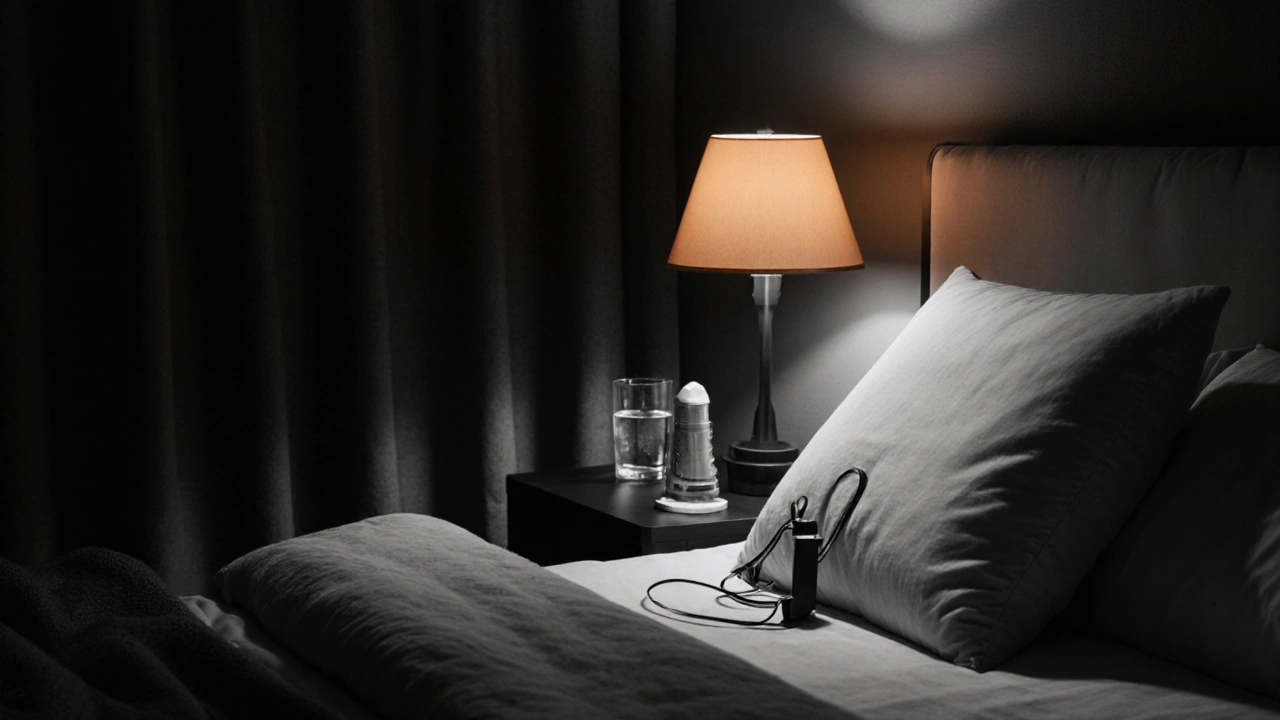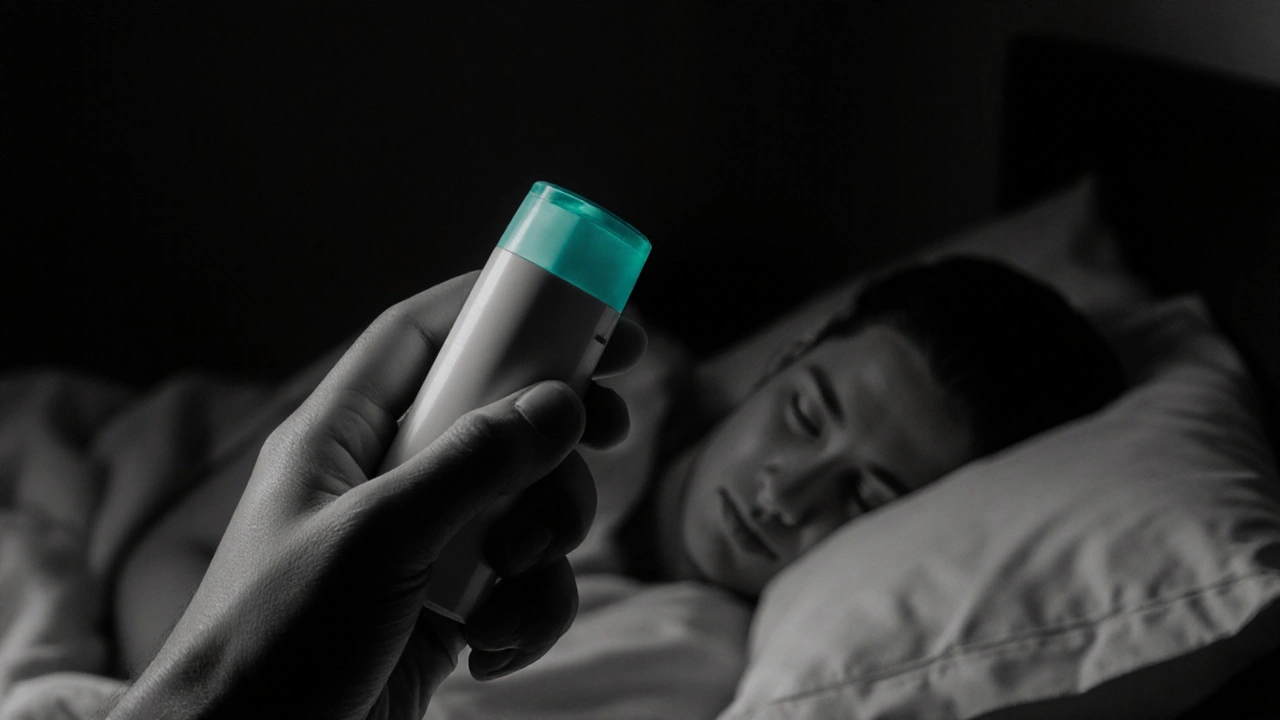Inhaler Timing Calculator for Better Sleep
Calculate Your Optimal Dose Time
For best sleep results, take your Budesonide/Formoterol at least 2-3 hours before bedtime. This reduces side effects like mild tachycardia and throat irritation that can disrupt sleep.
Your optimal dose time:
When you rely on Budesonide/Formoterol is a combination inhaler that pairs an inhaled corticosteroid (budesonide) with a long‑acting beta2‑agonist (formoterol) to control asthma and chronic obstructive pulmonary disease (COPD), the last thing you want is a restless night. Unfortunately, the medication itself, the disease, and everyday habits can all play tricks on your sleep. Below you’ll find why the drug can affect bedtime, what symptoms to watch for, and a toolbox of easy‑to‑apply tricks that let you breathe easy and stay asleep.
Why Nighttime Symptoms Happen
Both asthma is a chronic inflammatory airway disease that often worsens after dark and COPD features lingering airway obstruction that can flare up at night. When you lie down, gravity shifts mucus toward the throat, airway tone drops, and the body’s natural cortisol rhythm dips, all of which can trigger nighttime bronchoconstriction is the narrowing of airways that feels like a “tight chest” just as you’re about to drift off. The result: coughing, wheezing, and a sudden urge to reach for your inhaler.
How Budesonide/Formoterol Can Influence Sleep
While the medication is designed to keep airways open, it can have indirect effects on sleep:
- Stimulatory properties of formoterol: As a long‑acting beta2‑agonist, formoterol can mildly increase heart rate and cause a jittery feeling if taken too close to bedtime.
- Local throat irritation: The propellant may leave a ticklish sensation that prompts coughing fits.
- Systemic corticosteroid exposure: Even low‑dose budesonide can alter melatonin production in sensitive individuals, subtly shifting the body’s sleep‑wake cycle.
These side effects don’t affect everyone, but recognizing them early helps you intervene before they ruin your night.
Key Sleep‑Friendly Strategies
- Time Your Dose Smartly: Aim to use the maintenance inhaler at least 2‑3hours before bedtime. If you need a rescue puff, keep it low‑dose and try a breathing technique (slow, diaphragmatic breaths) before reaching for the device.
- Optimize Your Bedroom Environment: Keep the room cool (16‑18°C), use blackout curtains, and eliminate noise with earplugs or white‑noise apps. A stable environment reduces the chance that mild airway irritation will wake you.
- Practice Good Sleep Hygiene - Sleep hygiene is a set of habits that promote sound sleep:
- Avoid caffeine after 2p.m.; even a single cup of coffee can linger in your system for 6‑8hours.
- Limit alcohol, which can relax airway muscles and increase reflux.
- Turn off bright screens at least 30minutes before bed; the blue light suppresses melatonin is the hormone that tells your brain it’s time to sleep.
- Address Common Triggers: Gastro‑esophageal reflux disease (GERD) often worsens when you lie flat. Raising the head of the bed by 10‑15cm or using a wedge pillow can keep stomach acid down. If you’re a smoker, quitting removes a major irritant that can spark night‑time coughing.
- Stay Hydrated, But Not Over‑Hydrated: Sip warm water throughout the evening to thin mucus, but stop drinking large amounts an hour before sleep to avoid frequent bathroom trips.
- Use a Spacer If Needed: A spacer device attached to your inhaler reduces oropharyngeal deposition, cutting down on throat irritation and cough.

When to Call Your Doctor
If you notice any of the following, it’s time to reach out:
- Waking up more than three times a night with coughing or wheezing.
- Feeling a persistent rapid heartbeat after using the inhaler before bed.
- Developing new anxiety or insomnia that doesn’t improve with the above tips.
- Any worsening of asthma control despite regular use of budesonide/formoterol.
Your clinician may adjust the dose, switch to a different combination (e.g., fluticasone/salmeterol), or add a nighttime‑only medication like low‑dose oral prednisolone for a short period.
How Budesonide/Formoterol Stacks Up Against Other Inhalers (Sleep‑Side‑Effect Focus)
| Inhaler | ICS Component (potency) | LABA Component | Typical Night‑time Side Effects | Best‑Fit For |
|---|---|---|---|---|
| Budesonide/Formoterol | Medium (budesonide 200µg) | Formoterol - rapid‑onset LABA | Occasional mild tachycardia, throat irritation | Patients needing quick symptom relief and good anti‑inflammatory coverage |
| Fluticasone/Salmeterol | High (fluticasone 250µg) | Salmeterol - slower onset | Less stimulant effect, but higher risk of oral thrush | Those prioritizing potency over rapid bronchodilation |
| Beclomethasone/Formoterol | Low‑medium (beclomethasone 100µg) | Formoterol | Similar to budesonide, slightly lower systemic corticosteroid exposure | Patients sensitive to corticosteroid side effects |
The table shows that budesonide/formoterol’s stimulant‑related sleep impact is modest compared with some higher‑dose combos. If you’re especially sensitive to heart‑rate spikes, discussing a switch to a less‑potent LABA may be worthwhile.
Quick Checklist for a Restful Night
- Take maintenance inhaler at least 2hours before bed.
- Use a spacer if throat irritation occurs.
- Keep bedroom cool, dark, and quiet.
- Follow sleep‑hygiene rules: no caffeine after 2p.m., limit screens, avoid alcohol.
- Elevate head of bed if you have GERD.
- Stay hydrated, but stop large fluids 1hour before sleep.
- Track night‑time symptoms in a simple journal; share patterns with your doctor.
Frequently Asked Questions
Can budesonide/formoterol cause insomnia?
A direct link to full‑blown insomnia is rare, but the formoterol component can increase heart rate and make some people feel a bit “wired” if taken right before sleep. Timing the dose earlier in the evening and using a spacer usually reduces this effect.
Should I switch to a different inhaler to improve sleep?
Not automatically. Most patients achieve good sleep with simple adjustments. However, if you consistently wake up with a racing heart or severe cough, discuss alternatives such as fluticasone/salmeterol or adding a low‑dose nightly oral steroid with your clinician.
Is it safe to use a spacer every night?
Yes. A spacer reduces medication deposition in the mouth and throat, lowering irritation and the risk of oral thrush. It also helps deliver a more consistent dose to the lungs, which can lower night‑time symptom flare‑ups.
What role does melatonin play for asthma patients?
Melatonin peaks at night and naturally dampens airway inflammation. Some studies suggest that low‑dose inhaled corticosteroids can blunt this rise, making sleep slightly lighter. If you suspect this, a short trial of a melatonin supplement (under medical advice) can be explored.
Can lifestyle changes replace medication for night‑time asthma?
Lifestyle tweaks-like avoiding allergens, controlling humidity, and adhering to sleep hygiene-greatly reduce night‑time attacks, but they don’t substitute for controller medication. The inhaler remains the cornerstone of keeping inflammation in check.

Narayan Iyer
Hey everyone! Just wanna throw some cultural perspective on this whole bedtime inhaler thing – it’s not just a med, it’s part of a daily rhythm that syncs with our circadian clocks. When you pop that budesonide/formoterol too close to lights‑out, the formoterol can act like a little caffeine‑kiss, takin’ your heart a bit up‑n‑down. I’ve seen patients perk up, thinkin’ they’re in a meeting when they should be snorin’. A good move is to set a reminder 2‑3 hrs before you hit the pillow, that way the LABA kicks in while you’re still wind‑downin’. Also, if you’re into tech, a smart‑spacer can help reduce throat tickle – trust me, the less cough, the better the Zzz’s.
Amanda Jennings
Totally agree, timing it earlier really makes a difference!
Shweta Dandekar
Dear readers,!!! I feel compelled to point out, with the utmost clarity, that the nuances of inhaler timing are not merely trivial anecdotes; they are foundational pillars of nocturnal respiratory health!!! First, the physiological cascade triggered by formoterol is akin to a gentle alarm clock for the airways, but when administered too late, it becomes a discordant shout! Secondly, the local throat irritation, often dismissed, can cascade into a cough reflex that interrupts deep sleep phases, leading to fragmented REM cycles!!! Third, systemic corticosteroid exposure, even at low doses, has the potential to blunt melatonin synthesis, which is the hormone that orchestrates our natural sleep‑wake rhythm!!! Moreover, environmental factors such as bedroom temperature and humidity can either exacerbate or ameliorate these pharmacologic effects!!! It is therefore imperative to adopt a holistic approach: maintain a cool room (around 17 °C), employ blackout curtains, and consider a wedge pillow to mitigate gastro‑esophageal reflux!!! Additionally, be vigilant about caffeine intake; a single cup after noon can linger for 6‑8 hours in the system!!! Finally, keep a nocturnal symptom diary – note the timing of each inhaler use, any heart‑rate sensations, and the frequency of awakenings!!! This data, when shared with your clinician, can guide nuanced dose adjustments and perhaps the addition of a low‑dose nocturnal oral steroid if warranted!!! In essence, the synergy between medication timing, sleep hygiene, and environmental control is the cornerstone of a restful night for asthma and COPD patients!!!
John Barton
Oh sure, because a little jitter from a LABA is exactly what you need to feel like you’re on a roller‑coaster right before you’re supposed to be dreaming. Who needs a calm night when you can have a heart‑racing soundtrack starring your own lungs?
Grant Wesgate
😅 Gotcha! Just remember, if the pulse starts doing the cha‑cha, a spacer can tone it down. Also, a quick chill‑out playlist can mask the "wired" feeling. 🎧👍
benjamin malizu
While the article provides a surface‑level overview, it neglects to address the underlying pharmacodynamic variability among patients. The assertion that “timing the dose earlier” suffices ignores inter‑individual differences in beta‑agonist receptor sensitivity. Furthermore, the suggested use of a spacer, though beneficial for oropharyngeal deposition, does not mitigate systemic corticosteroid absorption, which can subtly affect melatonin synthesis. The piece also fails to cite robust clinical trials supporting the recommended sleep‑hygiene practices in the context of budesonide/formoterol therapy. A more rigorous, evidence‑based approach is warranted.
Maureen Hoffmann
Great points, but let’s not forget that practical tweaks-like a cool room and a consistent bedtime routine-can make a huge difference, even if the science isn’t crystal clear. Small wins add up!
Alexi Welsch
In light of the foregoing, it is incumbent upon the author to furnish a more methodical appraisal of the pharmacological interactions described herein. The present exposition, while accessible, lacks the requisite detail to satisfy a clinically discerning readership. A meticulous delineation of dose‑timing protocols, accompanied by quantifiable outcome metrics, would substantively elevate the discourse.
Mike Privert
I appreciate the formal tone, but from a pragmatic standpoint, the key takeaway is simple: schedule your inhaler earlier, keep your bedroom comfy, and track symptoms. That’s what works for most patients.
Kartikeya Prasad
Here’s a quick cheat‑sheet: set an alarm for two hours before sleep, use a spacer, keep the room cool, and log any nighttime coughs. If you still feel "wired," consider a low‑dose melatonin after consulting your doc 😊. Trust me, a little organization goes a long way!